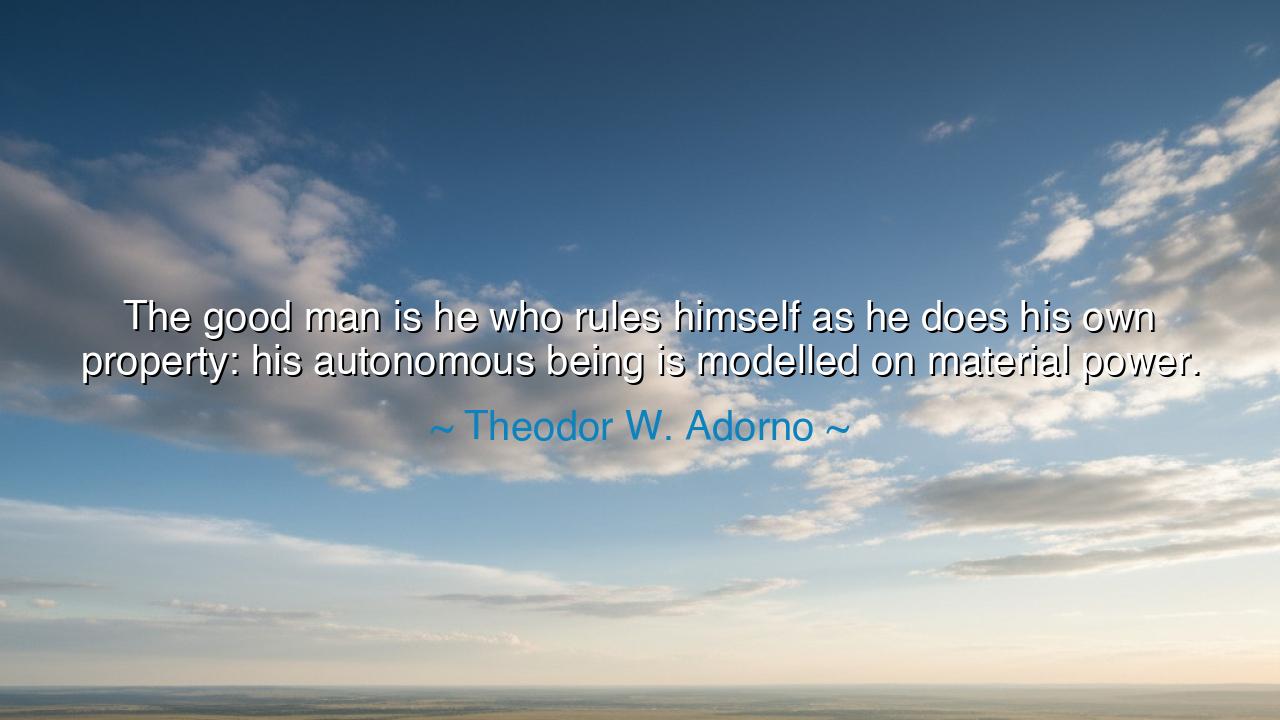
The good man is he who rules himself as he does his own property:
The good man is he who rules himself as he does his own property: his autonomous being is modelled on material power.






When Theodor W. Adorno wrote, “The good man is he who rules himself as he does his own property: his autonomous being is modelled on material power,” he spoke with the piercing insight of one who had seen how deeply the modern world had entangled the soul with possession. These words are not gentle—they are a mirror held up to the heart of civilization. Adorno, philosopher of the twentieth century’s turmoil, reminds us that the so-called good man of society is often not a saint of spirit, but a master of control—one who governs himself as he governs his property, measuring his virtue not by compassion or freedom, but by the cold order of ownership. In this sentence, Adorno reveals how deeply the idea of autonomy—once the symbol of moral freedom—has been reshaped by the logic of power and possession.
The origin of this thought lies in Adorno’s lifelong critique of modernity, capitalism, and moral conformity. Living through the age of totalitarianism and industrial domination, he saw that people had learned to treat not only their possessions but their very selves as commodities—something to manage, discipline, and display. To “rule oneself,” once the mark of ancient virtue, had become a reflection of material mastery: a self polished and ordered like a fine estate, disciplined not for truth, but for status and control. Thus, when Adorno writes of the “good man,” he speaks ironically, unmasking a moral code that confuses self-control with self-possession, and virtue with dominion.
The ancients—such as Socrates or the Stoics—taught that to “rule oneself” was to master desire, to free the soul from passion and ignorance. But in Adorno’s time, this teaching had been twisted by a world obsessed with ownership. The modern man’s “autonomy,” he says, is no longer spiritual—it is economic. He governs his impulses not to attain wisdom, but to maintain productivity. He disciplines his body not for harmony, but for market worth. His morality, like his possessions, is measured and contained. He is a ruler of himself only because he has learned to mimic the rule of property. In this way, autonomy, the noble freedom of the ancient soul, has become a pale imitation of material power—the spirit shackled in the image of its own possessions.
Consider the story of Andrew Carnegie, the great industrialist of the nineteenth century. He rose from poverty to immense wealth, becoming a symbol of the “self-made man.” To many, he was the embodiment of virtue—disciplined, industrious, and frugal. Yet his empire was built upon the sweat and exhaustion of thousands of laborers whose lives were consumed by his ambition. He ruled himself as he ruled his business—with efficiency and command—but his moral independence mirrored his economic domination. To his credit, Carnegie later turned to philanthropy, seeking redemption through generosity. But Adorno would have seen in his story the very tension he describes: a soul modelled on the logic of property, striving to do good through the very tools that had perpetuated inequality.
Adorno’s insight warns that the moral ideal of modern society often hides the same structures of domination that rule its markets. When we praise “self-control” or “discipline,” we must ask: to what end? Is it the freedom of the spirit, or merely the refinement of a machine? The man who rules himself as property may appear noble, but his autonomy is bound by the same chains he uses to control. He does not live in harmony with himself; he manages himself. He treats his emotions, his time, even his conscience as resources to be optimized. And though the world calls him good, Adorno sees in him a quiet tragedy—the loss of the living soul to the idol of efficiency and order.
Yet, within this critique lies a deeper lesson. Adorno’s words do not condemn self-discipline itself, but the spirit behind it. True autonomy, he reminds us, is not the imitation of power, but liberation from it. To rule oneself rightly is not to govern the soul as property, but to tend it as one tends a garden—with patience, compassion, and humility before nature’s mystery. The good man does not impose mastery upon his being; he cultivates it in balance with the world around him. His independence is not a fortress of control, but a state of harmony—a freedom rooted in relationship, not possession.
So, my children of thought, take heed: do not measure goodness by order alone, nor strength by mastery. The world will tempt you to treat your soul as an empire to be managed, your time as wealth to be spent, your virtue as a commodity to be admired. Resist this. Let your autonomy be born not of domination, but of understanding. Rule yourself as a friend rules himself—with care, with honesty, and with reverence for what cannot be owned. Seek not to be a master of your soul, but its faithful steward. For when you cease to imitate material power, and begin instead to honor the living mystery within, you will find what Adorno sought—a freedom untouched by the chains of possession, and a goodness no world of property can buy.






AAdministratorAdministrator
Welcome, honored guests. Please leave a comment, we will respond soon